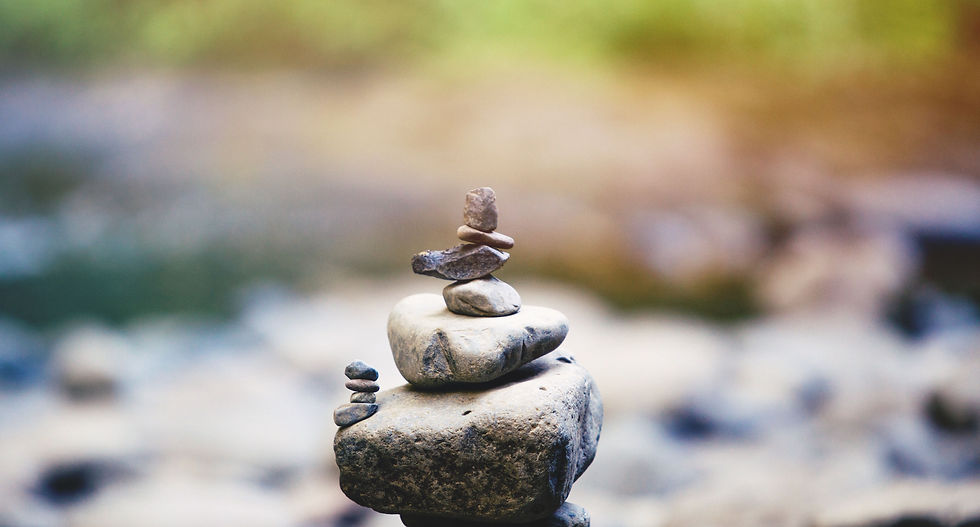Restacking Foundational Habits
- Valerie Biehl

- Aug 1, 2019
- 3 min read
Updated: May 27, 2021

Occasionally, life gets away from us. And that is ok. Sometimes getting out of balance in the short term is the only way to create the life we want in the long run. But, when the ability to regroup does arise, so does the opportunity to incorporate what we have learned, refine our goals, and better define what it means for each of us to thrive every day.
I had a rare opportunity, recently, to reexamine what it means for me to live a healthy and my best life. That journey led me to re-explore research on foundational habits. Here is the concept distilled: if a person can manage to establish solid foundational habits, they will have created a foundation where all other things then become possible. Developing solid foundational habits enables a person to have the physical energy, mental energy, and self-control necessary to adopt new habits and accomplish their big goals in life.
Here is the breakdown of guidance around foundational habits.
Foundational habits that are nearly universally recommended and physical body-focused: getting enough sleep, getting exercise, managing your eating and drinking
The next level of habits commonly recommended are mental wellness-focused: practicing gratitude and meditation, taking breaks, incorporating deliberate and regular recovery time (love this one!), limiting mental input (primarily digital content)
The final level of habits occasionally recommended are external world and productivity-related: waking up early, developing a morning routine that changes the trajectory of one's day, developing an evening routine that set up for restful sleep and a productive following day, creating external order (mostly time management, decluttering and simplifying)
While I subscribe to and advocate the benefits of each of the above, something fundamental was missing for me. That something that made all other foundational habits worthwhile and meaningful, human connection. If we don't have human connection, not much else matters. There are very few things we can do on our own steam. There is very little success we can have without creating value for or helping others. There is very little joy that we can have in strict isolation.
The Harvard Study of Adult Development, thought to be the longest study of adult life of more than 720 men, reinforces this idea. It began in 1938 with two seemingly polarized groups, a group of Harvard sophomores and a group of some of the poorest and most disadvantaged inner-city boys from Boston. Over the years, participants have been surveyed, interviewed, medical records reviewed, children and spouses/partners interviewed, blood analyzed, and brains scanned all in search of what makes people happy and healthy. The clear outcome of the study is that good relationships are what keeps us happier, healthier, and help us live longer, more than anything else. And loneliness, feeling more isolated than we want to be from others, is toxic. Those with connections to family, friends, and community are happier, physically and cognitively healthier, and live longer than those less connected. It is the quality of relationships that matters most, not the number. It is connection with others and being able to count on one another that is the bedrock that enables all else.
Therefore, I added the below as the most important and foundational of habits for the life I want and need to live.
Foundational Habit #1: Actively and deliberately create human connection
Here is how I will go about building this foundational habit:
Regularly reaching out to those I love or want to cultivate a relationship with to let them know I support and care for them
Regularly doing small acts exclusively to help and further the development of others
I would encourage each of us to stay up a little later to have a meaningful chat with someone, have that piece of cheesecake to celebrate a particular moment in someone's life, and perhaps even skip the gym if someone calls and needs help. I recommend that we each explore with others to ensure they are getting the human connection they need to make their goals more possible and meaningful. Human connection is protective of our bodies and minds. And it is what keeps us happier and helps us live longer, more than anything else.
Sign up to have new articles delivered directly to your email here.




Comments